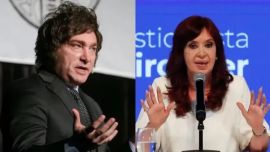Javier Milei was obstinate, stubborn, determined – and every synonym in between. He refused, under any circumstances, to let go of his main candidate in Buenos Aires Province, José Luis Espert. It did not matter how overwhelming the evidence was about his ties to the alleged drug trafficker Federico Andrés “Fred” Machado, nor the US$200,000 that this benefactor had transferred into one of his the lawmaker’s accounts. It did not matter that there were photos of the economist flying in the donor’s private jets or sunbathing by the pool of his ranch in Viedma. None of it seemed to matter: Espert appeared immovable. He had announced he would not step aside. And for some unknown reason, Milei seemed willing to honour that wish – even if it meant political self-destruction.
But then came the voices of reason, those closest to him, warning the President that such a course of action amounted to political suicide. Polls showed that Espert’s explanations about the scandal had convinced no-one but Milei himself. The lawmaker’s negative image rating had soared to an unprecedented 80 percent. Heading into an election with those numbers was impossible.
The first to speak out publicly was National Security Minister Patricia Bullrich, who said the candidate needed to clarify the situation once again because his initial responses – which framed the scandal as a “Kirchnerite operation,” part of a defence that claimed he had met Machado only once – had proved inconsistent. Presidential Spokesperson Manuel Adorni, a close ally of Milei’s sister Karina (who had never looked kindly on Espert), also warned that “if explanations are missing,” the press should “ask him.”
Former president Mauricio Macri, during his second recent meeting with Milei, was another who urged him to withdraw Espert’s candidacy. PRO deputy Diego Santilli, now the new head of the list, privately threatened to walk away if Espert remained at the top of the libertarian ticket. Milei’s top adviser Santiago Caputo whispered the same advice to the President: keeping “the Professor,” as the head of state calls him, meant only losses. It was campaigning alongside a political corpse – one they had already begun hiding from the final rallies even before his resignation.
In short, it was everyone against the President. And for once, the President had to give in.
Why did he take so long to make his decision? The answer may lie in Milei’s fear of what Espert knows. It was he, after all, who first brought the economist and TV star into politics back in 2021, when he included him in his Avanza Libertad alliance. Milei later broke away from Espert and, in several conversations since, has claimed the economist offered him US$300,000 to drop his candidacy that year in Buenos Aires City, which was the source of tensions with Espert’s strategic ally at the time, Horacio Rodríguez Larreta. More specifically, Milei said he had been offered US$300,000 in a suitcase, laid out on a table, an offer which he claims to have refused.
Espert, for his part, offers a different version in private: that the amount was smaller, and that it was actually a “monthly payment” he made to Milei for campaigning alongside him. In either version, there were unlikely to be any receipts involved – suggesting the money was undeclared.
Another striking coincidence that may explain why Milei found it so hard to cut Espert loose is the fact – already widely known – that they share the same lawyer: Francisco Oneto. And whom else does Oneto represent? Yes, that’s right, “Fred” Machado.



















Comments